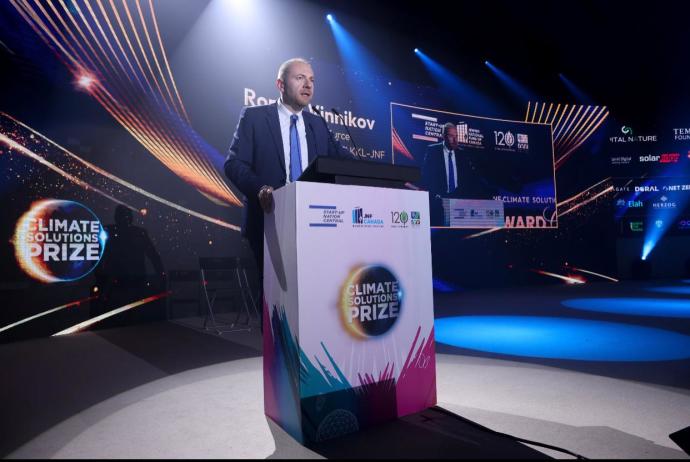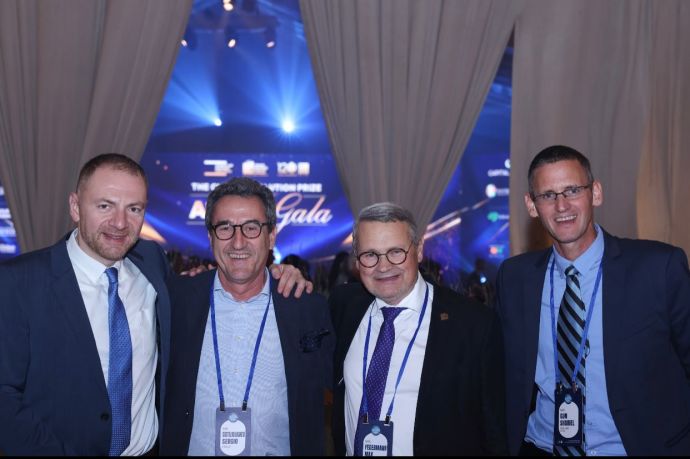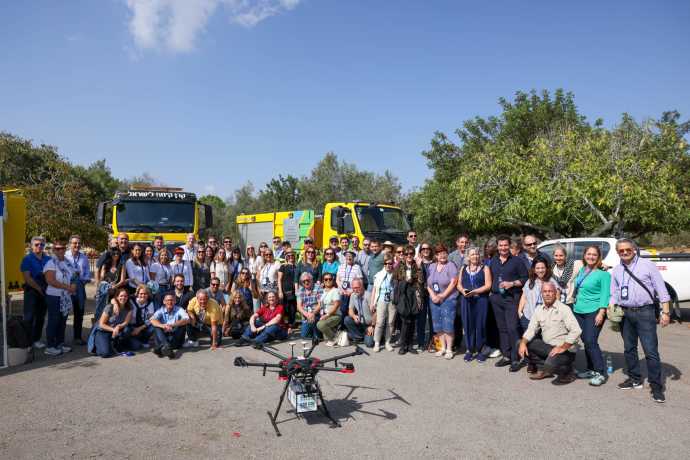This past week, the KKL-JNF held its biennial conference of KKL presidents in Jerusalem, during which presidents, board members and heads of Keren Kayemeth bureaus worldwide met for a week of discussions, professional tours and joint thinking about the organization’s policy.
“There is a long-standing tradition of KKL-JNF to host the presidents, management members and CEOs of the bureaus from all over the world every few years,” says Shariel Gun, director of the fundraising division of KKL-JNF’s Fundraising and External Relations Division. “KKL-JNF is an organization that operates in dozens of different countries, and one of the goals of the conference is to update our representatives on various developments and show them the projects for which we want to raise funds in the coming years, to present our work plans, to hear firsthand about the needs and challenges facing the heads of KKL-JNF around the world, and to meet the people who are working in the field and connect with them.”
The conference opened last Wednesday when the members of the delegations gathered at the Orient Hotel in Jerusalem and from there continued to visit the KKL-JNF’s Hall of Books of Honor, which was launched just this year. During the six days of the conference, a number of major events were held, including tours of fundraising projects, visits to historical sites, and various panels with the participation of delegation members.

“The purpose of the tours is for the representatives to see the projects to which they have contributed and helped bring about,” adds Gun. Due to COVID-19, the last time the conference was held was in 2018, and this year there was a particularly good response with the participation of over 80 presidents, board members and CEOs from 36 countries. The visitors received a tour of the Jerusalem Hills, the Western Wall, the KKL-JNF Heritage Center in Kiryat Malachi and participated in panels on fundraising projects, impact investments and the climate crisis.
“This conference is very important because it allows us to strengthen the ties and relationships with our representatives abroad,” says Gun. “We communicate daily with them through emails and phone calls, but there is nothing like these meetings. We are together in the same place so that we can show them the fruits of their labor, thank them, listen to them and show them what we have been able to accomplish through the contributions they have brought to the projects.”

Groundbreaking research
One of the main events held during the week of the conference was the presentation of the Climate Solutions Award, a joint program of KKL-JNF, JNF Canada and donor Jeff Hart. As part of the program, prizes totaling $1 million were awarded for three groundbreaking studies in the field of reducing greenhouse gas emissions or increasing their absorption.
“The call for proposals was published in March of this year, and out of the dozens of proposals submitted, ten candidates remained, from which a panel of expert judges selected the three winners,” explains KKL-JNF Chief Scientist Dr. Doron Markel, who led the competition and judging process on behalf of KKL-JNF, in collaboration with experts from various fields, and in partnership with the Canadian team leading the prize on behalf of JNF Canada. One of the most prominent activists in promoting the award, and the issue of climate and renewable energies, is Emily Levy-Shochat, vice chair, and chair of the Environment Committee.

“The nominated proposals dealt with the fields of renewable energy and its storage, emission-reducing green building, streamlining and reducing emissions in water and wastewater management, reducing emissions from animals, and more,” added Dr. Markel. “The research proposals deal with issues that can reduce greenhouse gas emissions into the atmosphere. This is a three-year research grant in accordance with work plans submitted with the research proposals. The proposals we received, and of course the winners, were on a very high academic and professional level, at the top of Israeli and world academia, and there is no doubt that the winners are indeed groundbreaking.”
Ronnie Vinnikov, Head of Resource Development and External Affairs Division at KKL-JNF, adds, “KKL works for the Jewish people, and as a long-standing national institution, the relationship with the Diaspora is of utmost importance to us. That’s why once every two years, we convene the entire international leadership of KKL-JNF in Jerusalem. Due to the coronavirus, the current conference was held two years late. Now that the restrictions have been lifted, we have gathered again, and this has important meaning because we act in the name of the Diaspora and the name of the Jewish people, to protect the lands in the State of Israel, to develop them and operate within Israeli society for the development of the periphery.”
Vinnikov explains that one of the most prominent advantages of the conference is the meetings themselves. “It helps to get together once in a while, exchange opinions and hear what is happening in the Jewish communities around the world, where the wind is blowing in the communities, and what our leadership in the Diaspora sees as the ultimate goal of KKL-JNF in Israel. This is an opportunity for dialogue between the international leadership and the Israeli management and with the relevant officials.
“We present to them where we are headed in the coming years, including KKL-JNF’s flagship projects – the most important being dealing with the climate crisis – which is why we announced the launch of KKL-JJ’s International Center for Climate Research.”
Strengthening the periphery
Throughout the six-day conference, representatives of the delegations from abroad visited several significant sites and presented the various projects they had donated. One, located in the Tzora forest, is a park in memory of Raoul Wallenberg, one of the Righteous Among the Nations. Wallenberg was a Swedish businessman who worked as a diplomat in Hungary. He saved thousands of Jews from the death camps in Hungary thanks to his connections with representatives of the Nazi government and army. “Wallenberg is a key person in our ambition to strengthen the relationship between Sweden and Israel,” says Max Federmann, CEO of KKL-JNF Sweden, who presented the important project during the conference.
"One of the main events held during the KKL-JNF Presidents Conference was the presentation of the Climate Solutions Award."
Federmann adds that one of the most important issues for him to promote at the conference is the environmental crisis and the promotion of social issues for Israel. “Most people think that we only work on tree planting or environmental issues, but this is not so,” he says. “Among the issues we are promoting is strengthening the periphery in the State of Israel, so that not only the Dan region will prosper, but even remote areas will benefit from the hi-tech industry. We are working towards this through cooperation with communities and municipalities, such as Beersheba, for example, and the construction of infrastructure for education, such as the “KKL-JNF Heritage Centers” project. With the help of KKL-JNF, families who do not have financial means can send their children there, at no cost, to improve their level of education and help them succeed on exams. We view this to be of utmost importance.”
Bringing the spirit of KKL-JNF to the world
Another guest from abroad who participated in the event was the president of KKL-JNF Italy, Sergio Castelbolognesi, who stated that the biggest advantage of the conference was the meeting itself. “The conference is important because it brings us all together in Israel,” he explains. “We work for Israel, we promote its name in the world, and sometimes it’s good to see the faces of the people with whom we work. In addition, this meeting allows us to hold face-to-face discussions with activists from around the world, so that we can learn new techniques and even teach how to work with our local population to promote Israel, and of course, to contribute to KKL-JNF’s projects.”
Castelbolognesi explains, “Our presence now in Israel helps us bring the spirit of KKL-JNF to the world and understand it better. Of course, the conference allows us to hold discussions with different delegations and create new friendships; without this, it is impossible to work.” He says that KKL-JNF’s contribution does not end with environmental issues but also emphasizes the advancement of Israel in Italian society. “The Jewish community in Italy is very small,” he explains. “We give a great deal of attention to the schools, especially the Jewish ones, though not exclusively, and we try to educate the children about the history of KKL-JNF over the years, and explain about the future projects it has in Israel to make it a stronger country.
“The conference is very important because it allows us to strengthen the ties and relationships with our representatives abroad.”
“In addition, we maintain good relations with the Israeli institutions in Italy and assist them in promoting Israel to the local non-Jewish population, because the Italian media does not always know how to properly explain Israel. We are helping Italians understand that the developments coming out of the State of Israel are good for the environment and the climate, and that this is something that can improve their lives as well.”
Castelbolognesi adds that part of his activities are with the Italian authorities. “We conduct environmental activities together with Italian government institutions, alongside the usual fundraising activities for projects and tree plantings. One of the reasons this conference was so important is that we can now take everything we’ve learned, the information we’ve gathered, and improve our operations in our home countries for everyone’s benefit.”
This article was written in cooperation with KKL-JNF.
Translated by Alan Rosenbaum.
